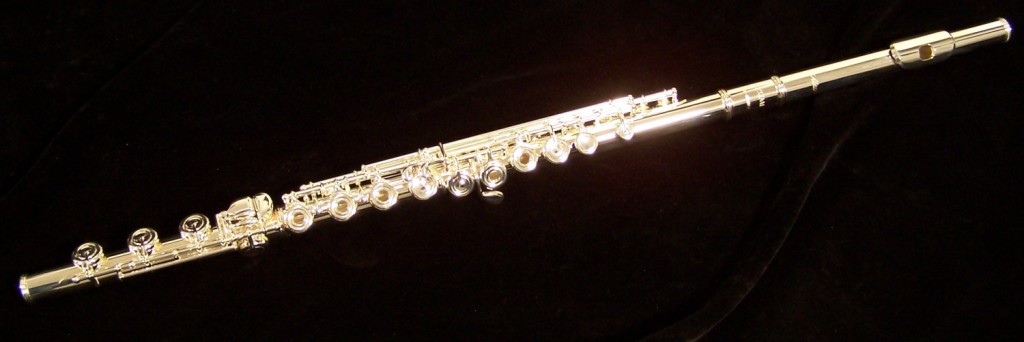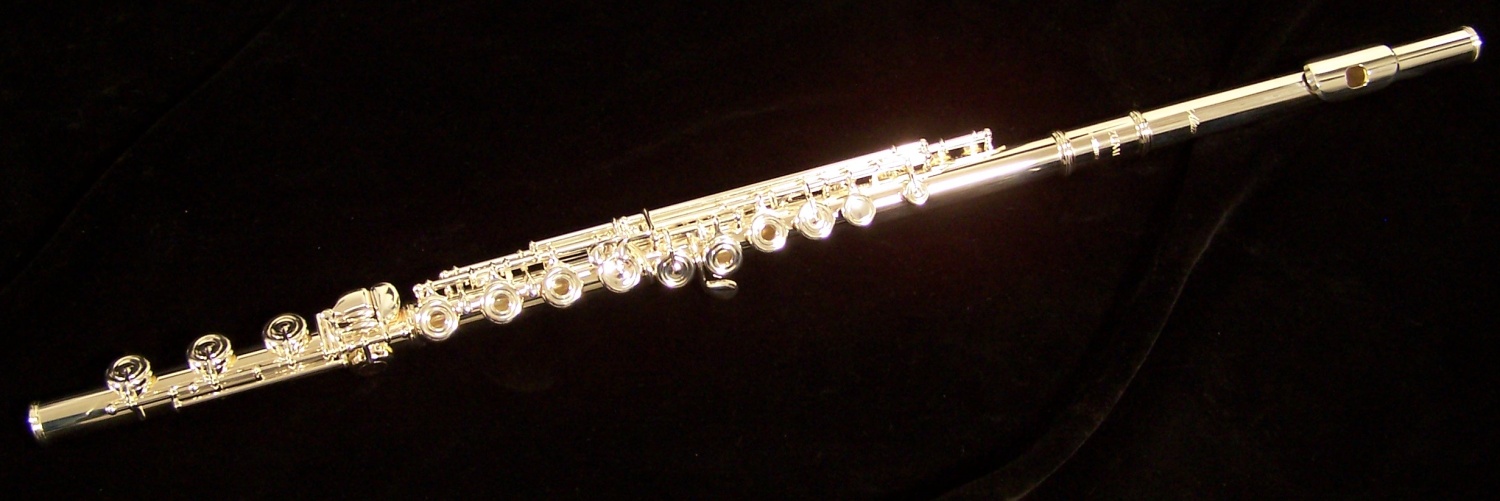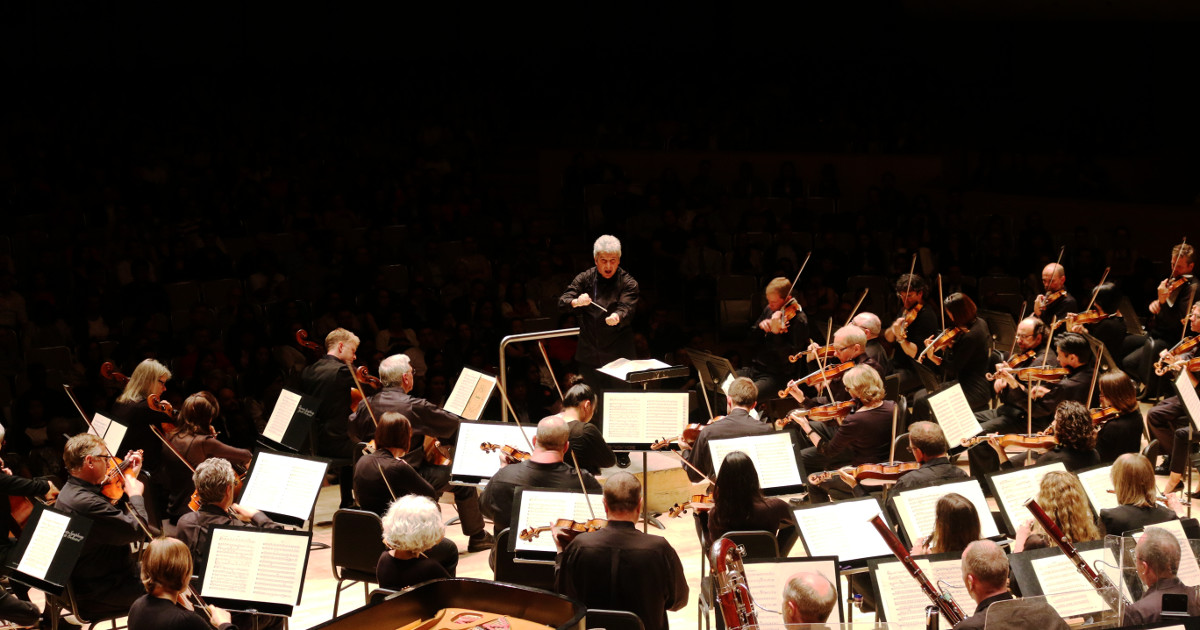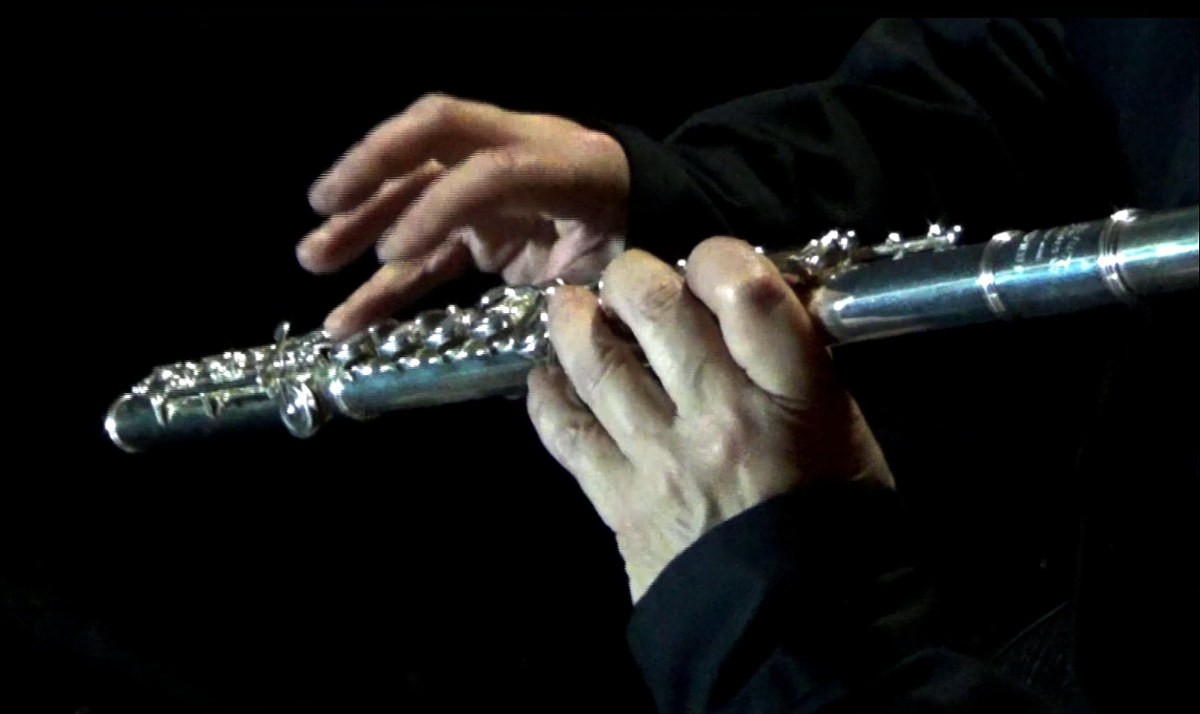Yeah. I know. It’s about time, huh! So, I’m working on EJRuek.com and CountryJames.com, then it will be DLKeur.com right after. Then, I’ll see about revitalizing Aeros’ site. Meanwhile, I did release another E. J. Ruek book. I just never got around to posting it up here on this, my main website. It’s titled Slightly Disturbing Stories and those folks who’ve read it seem to really, really like it.
Tag: DLKeur
Knowing the Next Note, Not Just Reading Ahead — Flute Technique

I haven’t seen this particular and helpful flute technique mentioned. There’s discussion about embouchure, about fingers, about breathing, about tone, but not much about something so simple and easy to do that it should go into every flutist’s (maybe even every musician’s) knowledge base. It was taught to me, so I’ll pass it along. It’s ‘knowing the next note’.
I’m not talking about reading ahead, where we are reading one, two, or more measures ahead of what we’re actually playing. No. This technique has nothing at all to do with whether you are playing something that you are reading off a score or something you are playing from memory.
‘Knowing the next note’ means: Have the next note you are going to play after the one you are presently playing already in your head. When you do this, your brain already has set up for the transition.
A lot of players play ‘in the moment’ only, note by note. They may know the piece inside and out, they may read ahead, but they’re concentrating solely upon the note they are playing — its intonation, its quality, its dynamics…a lot of things, including quality and type of vibrato. But. They fail to ‘know the next note’, much less the entire phrase, both of which are exceedingly helpful, giving your body, via your brain’s mental preparations, a head start in preparing for the fine motor skill changes that lead to smooth, clean transitions, note-to-note, regardless of difficult fingerings or of interval jumps. Here’s how:
When playing, simply ‘know the next note’. So, if I’m playing a first register A and the next note is a third register E, I already ‘know’ that, next, I will be playing that third register E, no matter how fast or slowly that E comes after the A. And as I’m playing that third register E, I ‘know’ that the next note I will play will be a second register D. Then, as I’m playing that second register D, I ‘know’ I will be playing a first register C# after that.
The ‘know’ is an active ‘knowing’, instant by instant, note by note.
If it’s a run that comes after, then, ‘know’ the run, and, especially, ‘know’ that run’s target note while playing the previous note.
In essence, you’re focused on the note you’re playing, but, underneath, are actively aware of the note you’re going to next. And it also helps to know the entire phrase in your head in the background, behind the active ‘playing this, knowing that next is this’ technique.
This is a ‘brain technique’ that, once mastered, effortlessly does magical things to performance for smoothing out transitions between even the most difficult fingering changes and intervals one must play.
Hope this helps you.

On Being a Member of a Great Orchestra

I found this quote a while back when following a conversation about the future of classical music and classical music performers.
…Orchestral players are trained to become highly-skilled performers who can turn little black dots and lines and all kinds of mysterious indications into a free-sounding musical experience. The exhilarating experience of playing in the middle of a group of some 90 musicians with an inner freedom and [at] the same time, perfect inter-relatedness with the others as if being a member of one large body, as a communal achievement, an experience where the dead letter of the text has been internalized so strongly that the music freely floats as one voice in a communal synthesis, is the freedom which has been struggled for by years and years of study and training, carried by love for the art form. It is difficult to explain this if you are not an orchestral musician of a (good) orchestra yourself…. — JOHN BORSTLAP July 28, 2017
Yet, in my opinion, Mr. Borstlap describes only the very surface reality of the experience that is playing in a good, even great, orchestra, conducted by a good, and better, great conductor. There is absolutely no experience that I know of, save maybe that of performing in a seriously superior choir, that comes even close to it, certainly not the common experiences most players have in their performance history. It’s an immersive experience that transports the performer to heights and breadths of humble — yes, humble — awe and ecstasy. One is humbled that one has been gifted this experience, that one is worthy of it and of contributing to it. And when it happens again and again, time upon time, then the realization that what you have in that group of musicians, bonded together by a conductor and by the scores you play, is priceless beyond scope. Everything else musical pales by comparison.
If there were one wish I could have for anyone who plays or yearns to play an instrument, it would be this experience. Sadly, that’s not possible. I could plant people amidst such an orchestral experience, yet they’d never really feel it. Oh, sure. They’d feel themselves immersed in the power of that sea of sound, in the energy of the musicians creating that sound, but they would lack one critical element — contributing to the creating of that moving sea of symphony. There is, in fact, nothing like it, and the proof comes at the end.
In the silence that follows the last note of the last bar played, breathing as one, the orchestra stills. And the audience, enraptured, holds that silence, seemingly interminably, until, all at once, something breaks the spell and, as one, erupts into applause, whistles, and cheers, tears streaming from some, laughter from others, giddiness or radiance from yet still others.
Or sometimes the music hasn’t even stopped when the audience breaks to its feet in wild applause, overwhelmed with the emotions stirred in them.
When it happens in rehearsal, though, and it does quite often when playing with a good orchestra, we all just sit, stunned by what we’ve accomplished, in a long moment of shared and humbled awe at ourselves and each other — at the fact that we just created a ‘moment’ in sound …that what we did was magical.
This is why I played. Those days are long over for me, but this is, to me, the ultimate experience in playing. It surpasses anything else one can do as a classical performer, and I wish, I really do, that every player could experience this, even just once.

A Followup on ‘Dawn’s Hands’
The responses have been interesting and mostly positive and supportive. It’s heart-warming when you find out that putting yourself on-the-line, front and center, for public response, nets you a crop of PMs via your website contact forms from people, young and adult, to whom your message holds significance to their own situations.
I think I really had no idea just how much ‘what you look like doing it’ would garner retaliatory remarks from the self-defined ‘beautiful people’ out there, not until we began posting our music videos. I really had no idea how many others had been negatively affected by people responding to their videos. (People say I don’t get out much, in the real world and on the Net, and, yes, I guess they’re right. 
“You answering that flute [expletive removed] has given my daughter new determination to start sharing her flute videos, again. Thank you.”
“I quit posting to [removed] and [removed] because people made fun of me. I still don’t think I will share anymore, but I like that you spoke up for us.”
“I uploaded a video of me playing and it was like I painted hit me on my face. It made me cry. Even my friends sided with them. You made it okay. Thanks for doing that.”
There are a bunch more, but the best, so far, I think, is this one:
“You made me brave again. Maybe it’s okay to be me.”
This comes all because I responded publicly to one of the critical private communications I’ve received about our music videos. I responded because I wanted to address the sheer mean-heartedness. I never wanted to do videos of us playing. That was my husband’s desire. I just enjoyed playing, again. But it all happened. And the Net being what it is, the negativity was bound to come, bringing the desire to retreat back to my safe, text-and-image-only world.
But, why should I be ashamed of me and the parts of me that has brought me success and joy in life? Why should anyone? So I responded, publicly. I wanted it known that, no matter the criticism, nobody, not me, nor anyone else, has to quit just because somebody’s mean. And, on the Net, you can very effectively respond in a way that calls the criticism out without getting into a private flame war and without publicly embarrassing the mean-spirited in front of others. Their anonymity is preserved, but their actions are front and center with public opinion, come what may, to the negative or positive, rendering judgement upon the situation.
I put myself on the line with my My Hands post and its corresponding video, and I’m happy to say that, yes, I think my goal is achieved. That these youngsters as well as the adults who have PM’d to say that my post and video has given them the reinforcement they need to be unashamed of themselves, despite negative feedback, makes it worthwhile.
And, to the person who said, “You’ve got a lot of chutzpah,” yes, I guess I do, and that’s a good thing, I think.

Those Darned Holes!

Hover over the links to learn about them before clicking. The links are all set to open in a new tab or window if on a tablet or PC.
Both the flutes I play, my beloved new Haynes and my Azumi, are what we flutists call ‘open hole’. Since suffering a broken elbow, one of my ring fingers doesn’t work quite how it used to. So, for that particular key, I’ve had to resort to using a little silicon plug to fill the hole. Plugging it brought about a discovery. First some back history, though.
When I play, due to bad training at the onset of my learning way back when, I have ‘high fingers’. A lot of flutists do, and it’s all from being started wrong. I’ve got another problem that is compounded by my high fingers. I’m indelicate, especially when playing intensely and with enthusiasm for a piece. Happily immersed, I’m completely unconscious that I’m pounding down the keys with my fingers, fingers which are quite strong and ‘athletic’ from riding horses since before I could ride a tricycle, from mucking stalls, hefting heavy hay bales, and all the other associated physical labor that goes along with girls and horses, fences and barns. That pounding of the keys wasn’t noticeable when I was playing classically, either solo or in an orchestra. We never used microphones or amplification, so the sound didn’t carry out to the audience.
Enter husband Forrest who brings things like condenser microphones into my life. Touchy, sensitive, can-hear-an-ant-walk-across-the-floor torture devices, condenser mics pick up everything! (Please don’t sneeze, cough, or laugh, or you’ll blow the mic’s diaphragm, rendering this very expensive and intimidating piece of equipment to the trash bin.) It didn’t matter if it was the huge monster mic that hangs suspended in its grotesque-looking mount or the tiny one on my headset hovering by my cheek. Both picked up every touch of hand, breath, and finger on the flute, every shift of a sheet of music. If I shifted my hand, it came through like a desperate grab for survival. When I inhaled through my nose and my mouth, something we do to get as much air into our lungs as fast as possible, it sounded like a dragon sniffing out dinner, while inhaling just through my mouth produced a slightly better result — a gryphon readying to roar. (We went with inhaling by mouth as preferable, though that significantly reduces the amount of air I can pull in the nanosecond usually allotted me by rock music.) The fingers? There seemed no hope for those, unless I really, really concentrated on finger technique instead of playing music, and, as any musician knows, no performance goes well if you’re not letting go every inhibition to ‘let it happen’.
But, listening, I noticed that one key wasn’t popping …or, should I say, wasn’t popping as much — the plugged hole.
Hmmm. Time to experiment.
Plug the rest of the open holes. …And, what do you know! The popping was cut in half, a great improvement.
‘French’, or open holed, flutes have their advantages, especially up in the flute’s fourth register (piccolo territory). It’s a register only used in obscure pieces that nobody much ever listens to or plays, unless in a flute competition or for a special performance featuring a composer’s works. Of course, open holes do have other uses, as well. They allow one to play a flutist’s version of chords, bend notes, and play quarter tones …among other abstract uses. For standard playing, however, plateau flutes, that is, flutes which don’t have open hole keys, work just fine, and, despite opinion to the contrary, don’t negatively affect tone quality and resonance, at least not to any but the most infinitesimal degree, if that. Plugging up the holes wouldn’t matter for most of what I’m asked to play now.
My experiment and opinion aside, the real test came when we had our next recording session. And, sure enough, though my right hand’s index and, especially, my middle finger still smacked the keys with such vigor that, thanks to the condenser mic, you’d think somebody was popping bubble-wrap during the session, the sound was much, much quieter. Darn. If only I’d known before we started laying down tracks long months ago.
